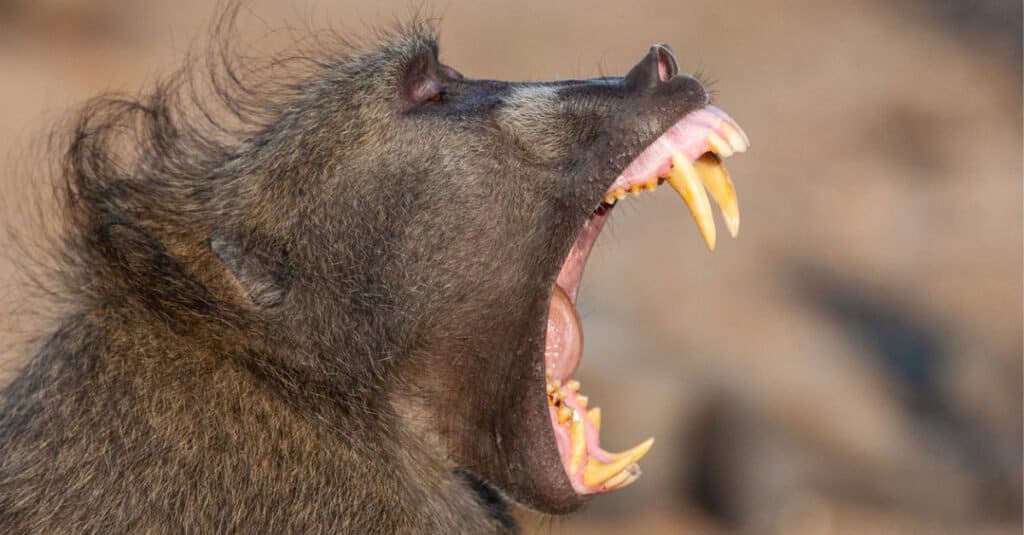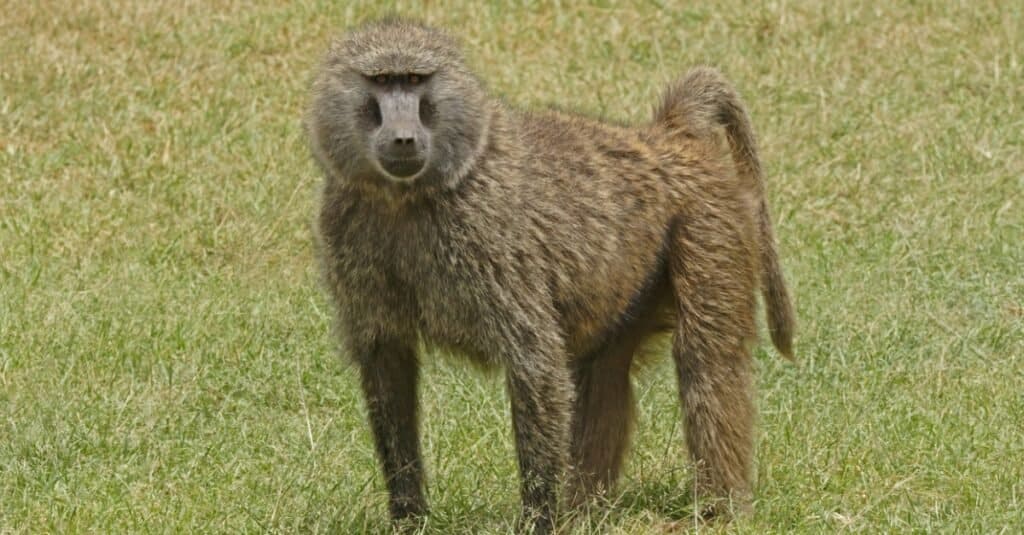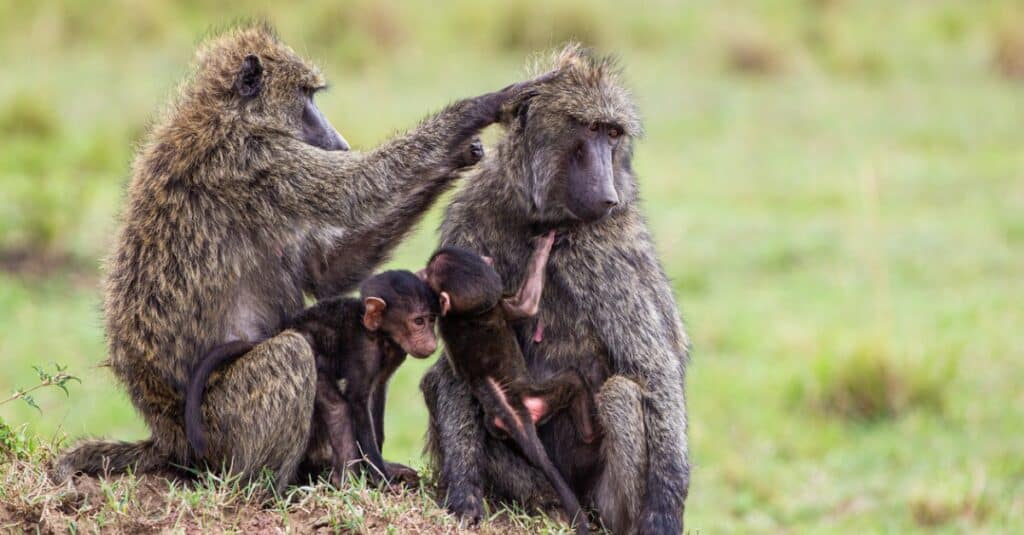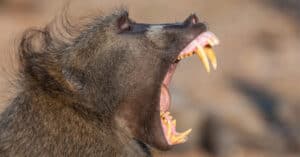One of the fascinating animals you’ll find in a zoo is a baboon. Baboons are exuberant animals and are social. Besides, they are great climbers and have a few tricks to show you if you allow them. But as fascinating as they are, you may be hesitant to approach one. As a matter of fact, many states illegalize keeping them as pets. So, you may be wondering: Are baboons dangerous? Can I go close to one? Let’s find out more about that in this post.
Are Baboons Dangerous?

Baboons can be dangerous when provoked or threatened.
©iStock.com/RudiHulshof
Like gorillas, baboons are only dangerous when provoked or threatened. They hardly attack human beings and are social animals. But under threat, they have two sharp canine teeth and sharp claws that they use to attack. Sometimes, they get aggressive when they see food on people. In such situations, they may try to aggressively obtain the food item from the owner.
As sociable and entertaining as they can be, it’s not safe to keep baboons as pets. They are unpredictable and can become aggressive when hungry. They have strong arms that are well-built from climbing from tree to tree. So even though they are not as large as gorillas, they are still strong enough to harm a human being. Therefore, it is often discouraging to feed them whenever you go to the zoo.
Can Baboons Attack Human Beings?

Baboons only attack to defend themselves.
©iStock.com/neil bowman
Baboons can attack human beings. But most times, they only attack people to defend themselves. So if you are not posing any threat to a baboon, you should be fine. Although they are only about 30 inches in height, baboons have very sharp canine teeth and claws. They can injure and even kill their victims. Additionally, they have great reflexes and vision. Don’t ever attack one because it can get defensive and aggressive!
Furthermore, baboons are notorious scavengers; they sometimes invade people’s territories searching for food. And in their quest for food, they will attack anyone that challenges them. There was a case reported by the LA Times of a baboon that was killed after getting excessively aggressive to collect other people’s food.
Has a Baboon Ever Attacked a Human?
Baboon attacks are common. However, reports of a fatal baboon attack are rare. These apes are native to South Africa. There are several reported cases of these animals raiding and attacking human beings, particularly for food. However, only one death occurred in a case involving a baby.
Typically, when a baboon is being provoked, it makes a loud screeching sound. You may be in danger if you see one running towards you with its tail tilted up while making this sound. These apes preferred to stay in the wild and hide from humans in the past. However, with people inhabiting areas close to the forest, they come out to search for food. So, they are becoming less fearful of people.
Will a Baboon Eat a Human?
Baboons don’t eat human beings. Remember: they only attack to defend themselves or steal food from people. These apes are omnivores and eat a diet of meat and vegetation. Despite being meat lovers, they don’t view humans as food. Their diet is composed primarily of grass, fruits, seeds, blooms, leaves, tree barks, birds, fish, insects, e.t.c. They also eat animals like hares and small antelopes.
Interestingly, baboons have 32 teeth like humans. They have two long canine teeth which are used to bite whenever they strike. Like gorillas, they show off their long canine teeth whenever they want to scare off predators.
Are Baboons Intelligent?

Baboons are very intelligent creatures.
©iStock.com/Wayne Marinovich
Yes, baboons are very intelligent. They have often displayed attributes that are equivalent to human-level intelligence. For instance, research has shown that baboons have a specific understanding of numbers. Amongst their social group, emotions like empathy are observed to be displayed by these animals. Besides, they are social animals that live in groups. They tend to have some form of organized social structure amongst them. A study also suggests the ability of baboons to differentiate real words from gibberish. It’s amazing how these creatures are evolving to pick up skills that are considered humanly possible.
Are Baboons Friendly?
Some baboons are fun to be with, especially those with female friends. Their ability to socialize makes it easy to spend time around people. Baboons groom one another when they are together. It’s not unusual to see them picking ticks in their fur. Research has it that socially-inclined male baboons will live longer than the isolated ones. Social isolation, being the opposite side of friendliness, is a serious threat to the survival of the male baboons. That is to say, stress and combat aren’t the major reasons some baboons do not live longer.
Social skills play a critical role in baboons’ lives; most of them have in-built friendly personalities. That means that baboons that display friendliness have a higher probability of exhibiting social bonds.
Do Baboons Make Great Pets?
Baboons do not make good pets because they have social and cognitive needs. Keeping baboons in a confined environment can make them sad. These animal species require constant interaction. Baboons require intensive care, which is not what many household owners can offer. In most cases, it ends with poor welfare for the owners and the monkeys. For that reason, some animal experts are creating awareness to make people understand the challenges associated with keeping baboons as pets.
The diet and enrichment needs are not cheap as you could have imagined. Additionally, most captive primates suffer from diabetes, which is challenging to manage. Perhaps you consult a vet doctor for proper health care – the cost is not what most homeowners can afford. Lastly, as social animals, baboons will likely survive when they live together rather than be isolated from their primary family. Even though you have good intentions towards the baboon, you will likely cause it to develop psychological damage by being away from its kind.
The photo featured at the top of this post is © iStock.com/neil bowman
Thank you for reading! Have some feedback for us? Contact the AZ Animals editorial team.






